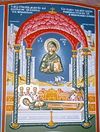

| Previous day | Next day |
| Old Style
September 16
|
Thursday |
New Style
September 29
|
| 15th Week after Pentecost. Tone 5. | Fast-free period.
|
![]() Greatmartyr Euphemia the All-praised, of Chalcedon (304).
Greatmartyr Euphemia the All-praised, of Chalcedon (304).
St. Sebastiana, disciple of Apostle Paul, martyred at Heraclea (86). Martyr Melitina of Marcianopolis (ca. 138-161). Martyrs Victor and Sosthenes, at Chalcedon (ca. 304). St. Dorotheus, hermit, of Egypt (4th c.). New Martyrs Isaac and Joseph, at Karnu, Georgia (808). Martyr Ludmilla, grandmother of St. Wenceslaus, prince of the Czechs (927). St. Cyprian, metropolitan of Kiev (1406).
Hieromartyr Cyprian, bishop of Carthage (258). St. Ninian, bishop of Whithorn (Candida Casa) (ca. 432). St. Edith, nun, of Wilton (984). St. Procopius, abbot, of Sazava in Bohemia (1053).
Thoughts for Each Day of the Year
According to the Daily Church Readings from the Word of God
By St. Theophan the Recluse

Thursday. [Gal. 3:23-4:5; Mark 6:30-45]
And people ran afoot thither out of all cities…and came together unto Him. This is to the Bethsaida desert, where the marvellous filling of five thousand with five loaves of bread and two fishes was performed. What drew the people to the Lord? Sympathy towards the Divine. The Divinity of the Lord, hidden under the cover of human nature, revealed itself in word, deed, gaze, and in all that was visible in the Lord. The manifestations of the Godhead awakened a feeling of the Godhead hidden in the heart, and through it drew people to the Lord. Nobody has power to hold back such a movement toward the Lord, not even the one who feels it, because it is deeper and stronger than all other movements. The same Divinity, manifested later by the Saviour, drew people of every tongue under the heavens to Him. It has been the same throughout the entire history of the Church, even to this day. A small trace of the Divine draws people to itself. What follows from this experience everywhere and at all times of our spirit’s aspiration for the Divine? What follows is that what is Divine, what is supernatural—is the Godhead, its source. This aspiration lies in the foundation of our spirit and constitutes its nature, as anyone can see from our intellectual, aesthetic and practical concerns. But in nature there cannot be lies and deception; consequently they do not exist in this aspiration for the Godhead. From this it follows that God and the Divine exist, and that the naturalists, in rejecting what is supernatural, are going against the nature of the human spirit.
Articles
 Venerable Edith of WiltonDmitry LapaSt. Edith (also Editha, Eadgyth, Eadgith) was one of the most venerated female saints of England. |





